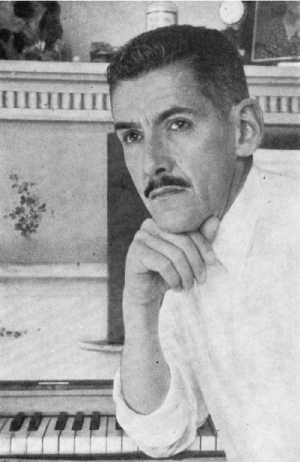Carlos Guastavino facts for kids
Quick facts for kids
Carlos Guastavino
|
|
|---|---|
 |
|
| Born | 5 April 1912 |
| Died | 29 October 2000 (aged 88) |
Carlos Guastavino (born April 5, 1912 – died October 29, 2000) was a famous Argentine composer. Many people consider him one of the most important composers from his country. He wrote more than 500 pieces of music, mostly songs for piano and voice. Many of these songs are still not published.
His music style was quite traditional, always using clear melodies and a rich, romantic sound. His compositions were strongly influenced by Argentine folk music, which is the traditional music of his country. Carlos Guastavino became famous mostly because of his songs. Some people even called him "the Schubert of the Pampas," comparing him to a famous European composer known for his many songs.
Some of his songs, like Pueblito, mi pueblo ("My Little Town"), La rosa y el sauce ("The Rose and the Willow"), and Se equivocó la paloma ("The Dove Was Mistaken"), became national favorites in Argentina. Unlike many other composers, Carlos Guastavino earned enough money from his music to not need other jobs.
Many famous musicians have performed or recorded Guastavino's works. These include Teresa Berganza, Martha Argerich, Gidon Kremer, José Carreras, Kiri Te Kanawa, Patricia Caicedo, Bernarda Fink, Cecilia Pillado, María Isabel Siewers, Jorge Chaminé, Agathe Martel, Karina Gauvin, Julie Nesrallah, and José Cura.
Life of Carlos Guastavino
Carlos Guastavino was born in Santa Fe Province, Argentina. He started learning music in Santa Fe with Esperanza Lothringer and Dominga Iaffei. Later, he continued his studies in Buenos Aires with Athos Palma.
He was a very talented pianist. In 1947, 1948, and 1949, he performed his piano pieces in London. He was invited by the BBC and also received a scholarship from the British Council. During these years, the BBC Symphony Orchestra performed the orchestral version of his Tres Romances Argentinos for the first time. This performance was led by Walter Goehr. Later, in 1956, Guastavino traveled to the USSR and China, where he performed his songs for voice and piano.
Guastavino's Musical Style
Carlos Guastavino's music was very different from other Argentine composers of his time, like Alberto Ginastera. His style showed influences from European composers such as Albéniz, Granados, Rachmaninoff, Chabrier, Falla, Debussy, and Ravel.
However, his music also clearly followed the style of important Argentine nationalist composers from the 1800s. These included Alberto Williams, Ernesto Drangosch, Francisco Hargreaves, Eduardo García Mansilla, and Julián Aguirre. Aguirre's gentle and personal piano writing especially influenced Guastavino.
Guastavino's choice to stay away from the modern and experimental music movements happening around him, and the clear Argentine nationalist themes in his songs, made him a role model for popular and folk musicians in Argentina during the 1960s.
Guastavino published more than 150 songs for voice and piano. He also wrote many pieces for solo piano, works for choirs, school songs, and chamber music (music for small groups of instruments). He set poems by famous writers to music, including Rafael Alberti, Leon Benarós, Hamlet Lima Quintana, Atahualpa Yupanqui, Pablo Neruda, Gabriela Mistral, and Jorge Luis Borges. He even wrote the words for a few of his own songs.
His works for orchestra included Divertissement; fue una vez. This piece was requested by Colonel W. de Basil for his Ballet Russe dance company. It was first performed at the Teatro Colón in Buenos Aires in 1942. Another orchestral work was Suite Argentina, which was performed in London, Paris, Barcelona, and Havana by the Ballet Español of Isabel Lopez. He also composed three Sonatas for guitar.
Awards and Recognition
Carlos Guastavino received many important awards and honors during his life. He won the Municipal Prize from the city of Buenos Aires for his chamber songs. He also received a prize from the Justice Ministry of Argentina.
The Cultural Commission of Santa Fe Province gave him a prize for his songs. "Vosotras" magazine recognized him with a prize for his "Canción de Navidad" (Christmas Song). Finally, the Organization of American States and the Inter-American Music Council gave him an award for his amazing creative work.
See also
 In Spanish: Carlos Guastavino para niños
In Spanish: Carlos Guastavino para niños
 | Valerie Thomas |
 | Frederick McKinley Jones |
 | George Edward Alcorn Jr. |
 | Thomas Mensah |

